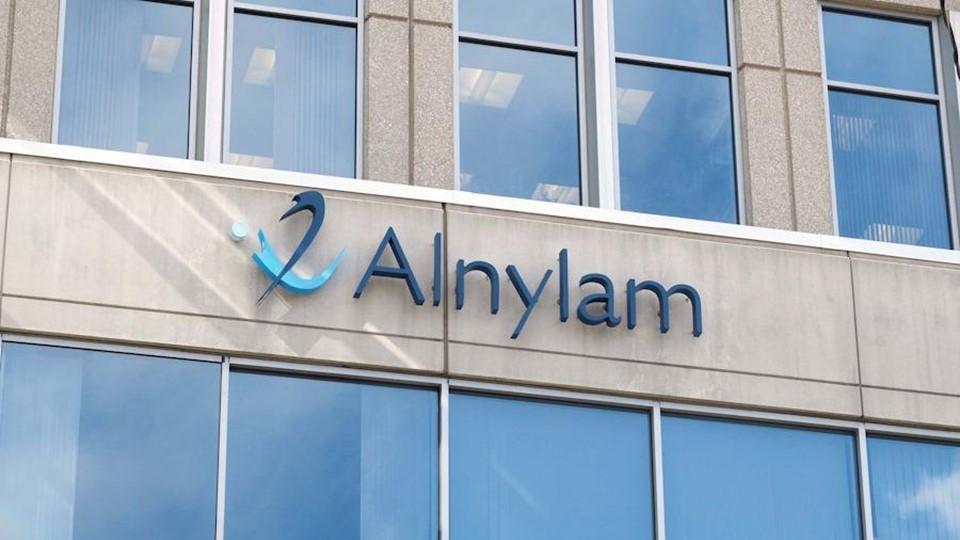Alnylam showcases long-acting amyloid drug at AAIC

With the first amyloid-targeting drug now approved for Alzheimer’s disease, Alnylam has presented preliminary clinical results with a new candidate that could potentially be dosed as infrequently as twice a year.
A single injection of Alnylam’s RNA interference candidate ALN-APP – which is designed to switch off the production of amyloid precursor protein (APP) in the central nervous system – was able to reduce levels of the protein by up to two-thirds at six months.
It’s the first clinical data in a programme that hopes to eventually clear amyloid from the brains of patients at risk of developing Alzheimer’s dementia with fewer doses than the first generation of antibody-based amyloid therapies.
Moreover, it is also the first time that an RNAi drug has been shown to achieve gene silencing in the human brain, according to Alnylam, which is developing ALN-APP in collaboration with Regeneron for both Alzheimer’s and related condition cerebral amyloid angiopathy (CAA), which can cause haemorrhaging in the brain.
Eisai and Biogen’s Leqembi (lecanemab), the first amyloid drug to get full approval from the FDA, has to be administered by intravenous infusion every two weeks. ALN-APP has to be given by intrathecal injection into the spine, but if it only needs to be dosed every few months could turn out to be less resource-intensive.
In a 20-subject phase 1 trial presented at the Alzheimer’s Association International Conference (AAIC) in Amsterdam, a single 75 mg dose of ALN-APP achieved a “rapid and sustained” reduction in soluble APP alpha and beta (sAAPa and sAAPb) in the cerebrospinal fluid (CSF) of patients, down 84% and 90%, respectively.
The data comes from the highest dose cohort in the single-ascending dose (SAD) study, with a peak reduction of 84% for sAAPa and 90% for sAAPb seen at two months. A 25 mg dose showed little change compared to placebo over six months, while the medium 50 mg dose has only been followed for three months so far, with reductions of around 70%.
After six months of follow-up, average reductions of sAAPa and sAAPb were 55% and 65%, respectively, with the 75 mg dose.
Partial clinical hold
While the initial results are encouraging in terms of the activity of ALN-APP on biomarkers levels, Alnylam and Regeneron will still have to link that to improvements in cognitive scores. The next stage is the multiple-ascending dose (MAD) portion of the current trial, which will boost the number of subjects to 60 and follow patients for at least a year.
In the US, that stage has been held up by a partial clinical hold put in place while a potential safety signal from animal toxicology studies is investigated. Approval has already been granted to proceed in Canada, where most of the subjects in the SAD stage were enrolled, while other planned investigation sites will be in the UK and the Netherlands.
“We’ve known for decades that mutations that increase APP production, or alter its proteolysis, cause early-onset Alzheimer’s disease, early-onset CAA, or both,” said Dr Sharon Cohen, medical director of the Toronto Memory Programme and a lead investigator in the study.
“These phase 1 results show that a single dose of ALN-APP can rapidly reduce APP production and that this effect is sustained at six months,” she added. “Given the critical need for new and better treatments for [Alzheimer’s] and CAA, these results are promising, and the approach warrants further study.”
For Alnylam, meanwhile, the result is a key endorsement of its C16-siRNA conjugate platform, designed to help RNAi drugs cross the blood-brain barrier and hit therapeutic targets in the CNS.
The company is working with Regeneron on 10 targets in the CNS as part of a $1 billion collaboration that started in 2019 across a series of indications, including amyotrophic lateral sclerosis (ALS) and Huntington’s disease.













